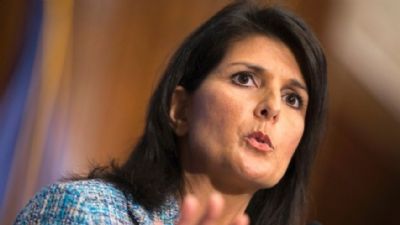American UN Ambassador Nikki Haley has decided to wade into the shark-infested waters of the UN Human Rights Council in Geneva.
On June 6, 2017, she will join a decades-long list of American diplomats who have given speeches about the "unacceptable" discrimination against Israel by the UN's top human rights body, and the "credibility" problem from welcoming human rights violators as members. The response is equally predictable: eye-rolls, yawns and a few disingenuous murmurs about UN reform.
It's about time we changed the script.
Haley will share the Council podium with a strange bedfellow: UN High Commissioner for Human Rights, Jordanian Zeid Ra'ad Al Hussein. Accusations of foreign meddling in U.S. elections have oddly neglected to zero in on the United Nations, and leading players like Zeid.
On October 12, 2016 the UN High Commissioner decided to gather the UN's built-in media entourage in Geneva and weigh in on the American election. It was not a regularly scheduled press briefing. He summoned the world's press specifically to alert the globe and American voters about the enemy, Donald Trump.
In the words of Zeid: "If Donald Trump is elected, on the basis of what he has said already, and unless that changes, I think it's without any doubt that he would be dangerous from an international point of view."
On cue, the High Commissioner's manufactured press briefing made headlines: "Donald Trump Is 'Dangerous' for Global Stability, U.N. Rights Chief Says (the New York Times);" "U.N. human rights chief: Trump would be 'dangerous' if elected (Los Angeles Times)."
The High Commissioner's direct effort to influence the U.S. election was questioned at a State Department briefing shortly thereafter. Far from being offended, Obama's State Department spokesperson John Kirby responded: "the high commissioner should speak to the appropriateness that he believes merit that. I'm not going to weigh in one way or the other on that."
It was not the first time Zeid had fashioned a role for himself in the American election. On September 5, 2016 in The Hague he announced "I am the global voice on human rights," and then declared Mr. Trump to be akin to ISIS. According to Zeid, Trump "shares with Da'esh" the modus operandi of the "arch propagandist." Even speaking on U.S. soil, before a group in Cleveland on April 15, 2016, he focused on the "crucial election for leadership of this country" and proceeded to describe "a front-running candidate to be President of this country" and "multiple candidates" – by which he meant Trump and other members of the GOP – as engaged in "calls to hatred."
Connections between senior Democrats, including Ambassador Samantha Power, and this Jordanian prince are not hard to find, along with a range of connections between the Jordanian royal family and the Clinton Foundation.
Zeid clearly expected a Clinton win and a big pay day for his UN office. He published an annual appeal for 2017 increasing his anticipated budget by a whopping 50% ($234,600,000 in 2016 to $360,509,200 for 2017). As the regular UN budget is essentially fixed, the increase was to come from so-called "voluntary" contributions, and the U.S. is the single largest contributor of voluntary funds to the High Commissioner's office. Mysteries remain: what exactly was he promised and by whom?
Haley's decision to go to Geneva, therefore, plants two key questions firmly in the minds of every listener. America is the UN human rights machinery's largest single donor, both by virtue of regularly assessed and voluntary contributions. So will Haley put her money where her mouth is, or is this a photo-op? And will the U.S. continue to belong and hence, to legitimize, a "human rights" body with an entrenched anti-Jewish and anti-Israel agenda?
The UN "reform" shell game may be a standing-joke in UN circles, but it matters for Haley who has staked her reputation on being serious about the UN's diabolical treatment of the Jewish state. The Council's permanent agenda, governing three sessions a year, has one item dedicated to Israel-bashing and one item to consider the other 192 UN members – should the Council feel like it. The Council was created in 2006 as the allegedly "reformed" UN Human Rights Commission, except the Council's Israel item is a replica of its predecessor.
When the 'new and improved' Council was rolled out, the Bush administration called the reform bluff and refused to join. President Obama leapt on board, and by engineering another three-year term that started on January 1, 2017, left President Trump holding the bag. Rather than tossing the pernicious concoction, however, the new administration sat down beside fellow Council "human rights" authorities China, Cuba, Saudi Arabia, Qatar and Venezuela.
In advance of her trip, Haley outlined in the Washington Post on June 2, 2017 membership "changes that must be made" and insisted "the council must also end its practice of wrongly singling out Israel for criticism." But "must" is a weasel word, without a bona fide "or else." Her audience awaits.
June 5, 2017
UN Meddling in U.S. Elections: Will Nikki Haley Bark or Bite at the UN Human Rights Council?

Nikki Haley (File photo)
Date
June 5, 2017
Title
UN Meddling in U.S. Elections: Will Nikki Haley Bark or Bite at the UN Human Rights Council?, Fox News
Author(s)
Anne Bayefsky
Original Source
